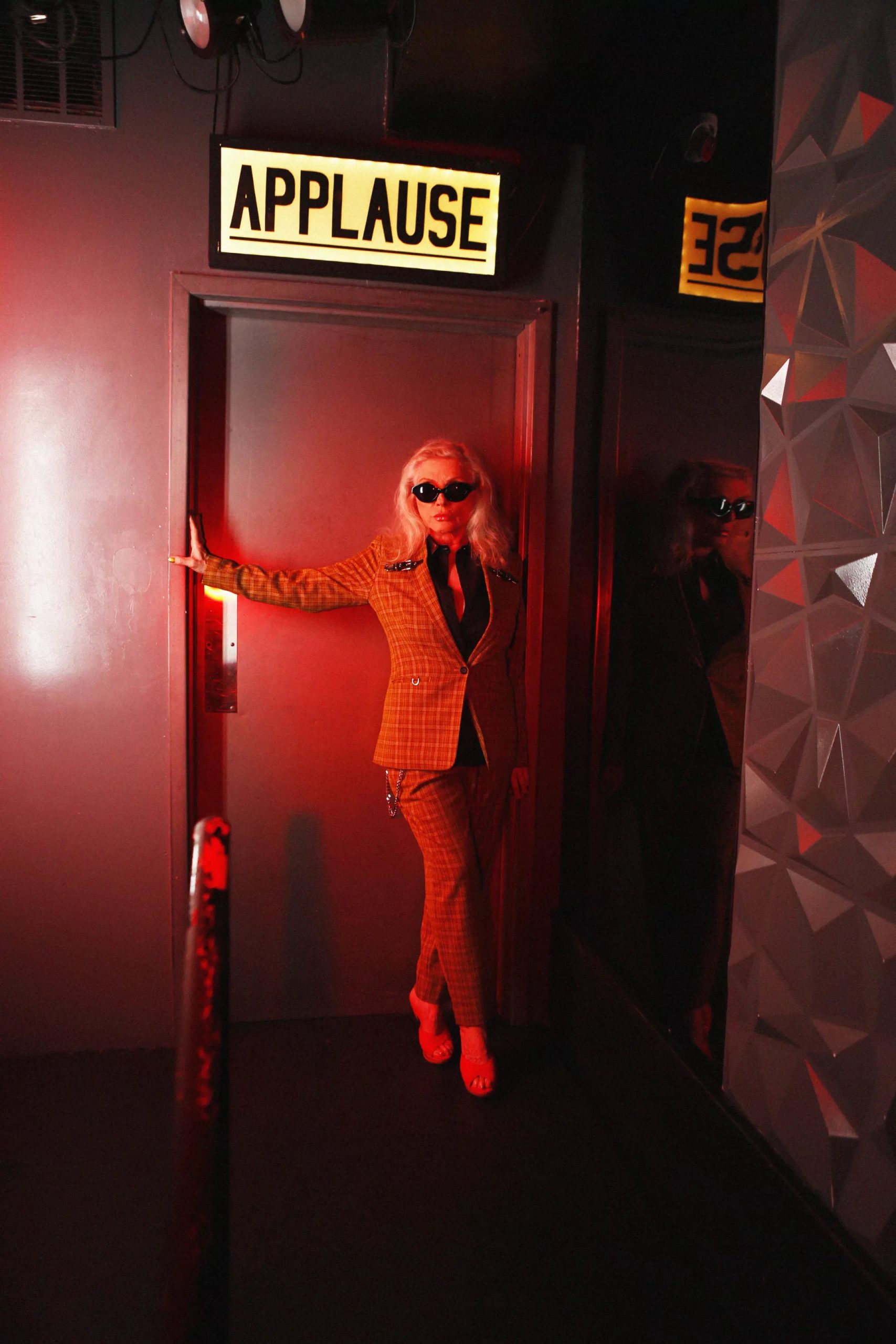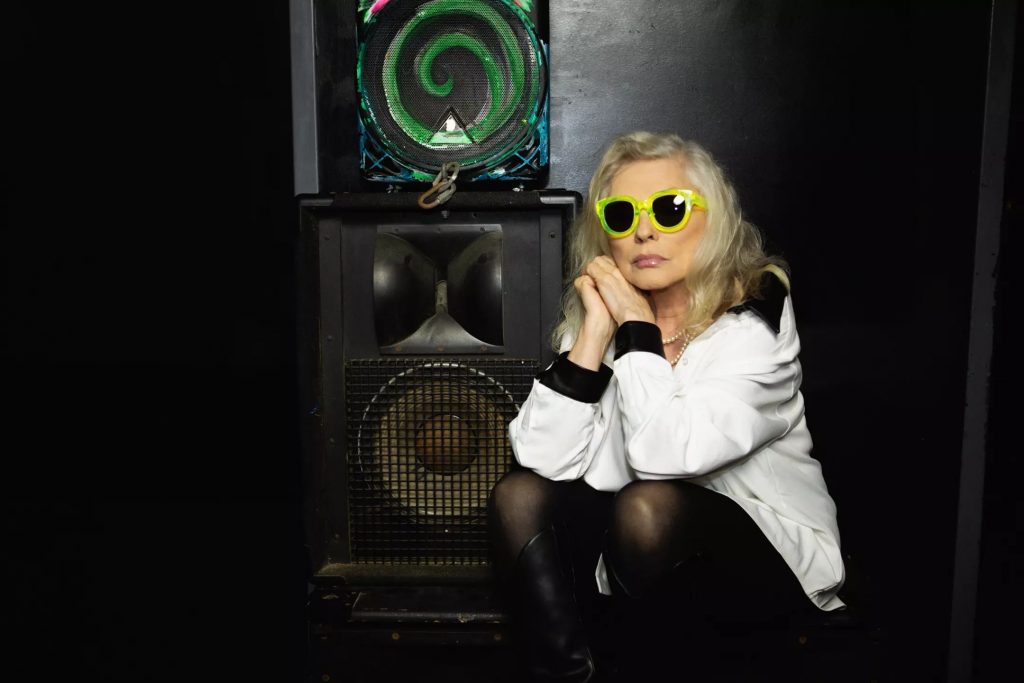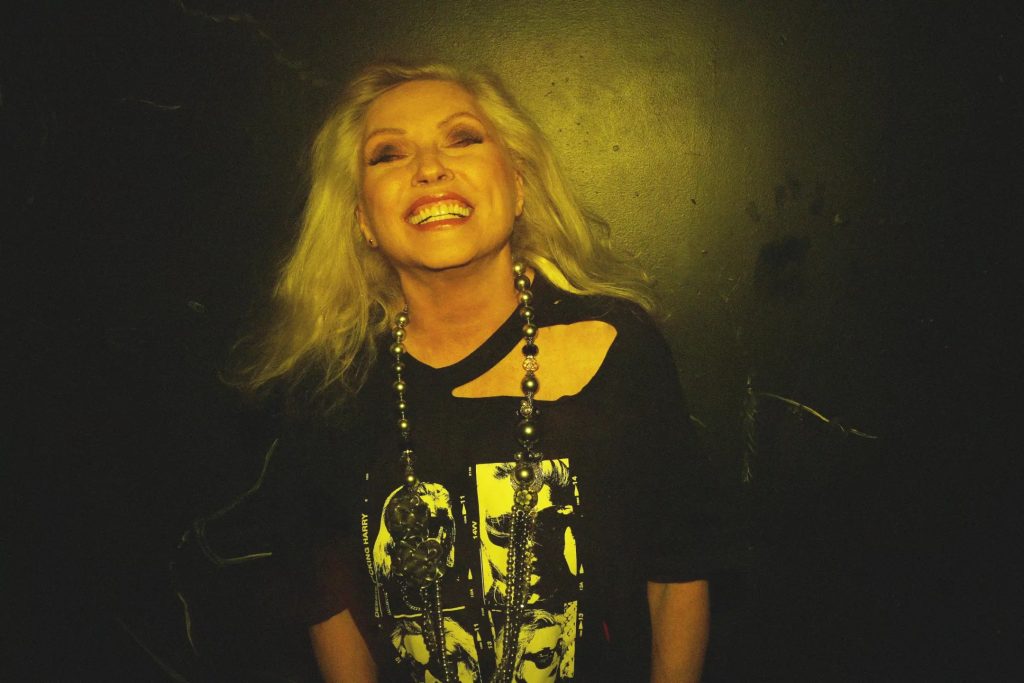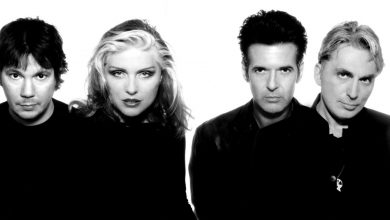Debbie Harry on how doing the ‘wrong’ thing motivates new Blondie album and fashion line
latimes.com
By Katerina Portela – 3rd September 2025
When you’re talking about Blondie frontwoman and style icon Debbie Harry, nothing is predictable. She appeared at our interview with opaque cat eye sunglasses and her signature shag haircut stylishly mussed. The smirk on her lips told me that our conversation would be memorable.
Decades before, she crashed onto the rock ’n’ roll scene with new wave and genre-bending band Blondie in 1970s New York City. It wasn’t without work and a lot of risk-taking— throughout her career, Harry has not been wanting to shy away from risks. From being the first musician to rap in a No. 1 Billboard song to pursuing a solo career and an acting career post-Blondie break-up, following her creative instinct is something that comes naturally.
“The seeds of creativity aren’t really just numbers and letters. It’s a lot more. It has to do with us. It has to do with soul,” Harry said.
Most recently, the fashion icon released a line of clothing inspired by her lifelong punk aesthetics and androgynous style. In collaboration with Oregon-based brand Wildfang, her most recent foray into fashion is indicative of one thing: Debbie Harry is still hungry to do more.
As Blondie gears up for its most recent album produced by John Congleton of St. Vincent, set to release early next year, Harry sat down for a conversation on her influential style in her new fashion line, how AI has nothing on her, doing the “wrong” thing and how that “old search for soul” is motivating her as she steps into the studio once again.
This interview has been edited for length and clarity.
I noticed in researching your career that there’s just so much reinvention. You’ve constantly reinvented yourself from a harmony singer to a lead singer in a band to soloist to an actress to band member again and now as a fashion collaborator. What do you think pushes you to constantly reinvent yourself and pursue new creative passions?
There are some things that I absolutely loved, but I didn’t take the chance. … At this stage in the game, I have to follow my rules. And I think for a young woman or a young girl to find that out about herself, it creates an awareness of who you are and your personality. And that’s sort of what young people do. They look for themselves, they look for who they are. And fashion can be a big part of that.
What would you describe as your style philosophy?
I think comfort. I want to put on what I’m going to wear and I want to feel right in it, and then I don’t want to have to think about it. I don’t want to have to be walking around the room making sure that my seams are straight, or my sleeves are right; I just want to have it on. I want to look great and I want to be comfortable in it.
For Wildfang, I got introduced to them through suits, and you know, I’ve always worn suits, like little boy things, and they’re fun. I think fun is an important thing to embody in what you do, that and some kind of silliness or fearlessness, that’s what turns people on, so I’m all for that. I’ve been doing it for so long, but I encourage younger artists to break the rules.

Something that I really love about your style is this very DIY approach to fashion that you’ve always had. Especially with the infamous zebra print pillowcase dress and other looks where you seem to tear things up and put different pieces together. How does this DIY approach translate for you today?
Sometimes when you start out, you have to experiment. And I’m really in favor of that. I think experimentation is the key to success, and that’s always been that way for me. I was sort of lucky in not having many options when I started and I did things that were wrong. They weren’t really styles at the time. They weren’t appropriate for the era. But doing things that you feel strongly about, coupled with the workability of a piece of clothing, even if it’s wrong, it could be right for you. So, I always tell people not to be afraid to do something that might be considered wrong.
I think that sort of applies to, as you were saying earlier, do it yourself, like taking that zebra striped pillowcase and making a hot little number out of it was the right thing. I don’t know, it just worked for me. I don’t know if everybody wants to be that individualistic. So that’s why finding a line of clothes that fits you right and suits your activities and your frame of mind, your mood, it’s all very, very personal, very important.
I wanted to talk about your new album. I’m really excited to hear it. I listened to “Pollinator,” and I really loved this very fresh, almost rebellious sound that permeated the music. How would you describe the essence of your upcoming album?
I think our tradition has always been to cover a lot of different styles and to embody some different moods. So in that respect, it’s a very traditional Blondie album. I think the thing that makes people carry on with us is that we’re excited about what we do, and we work hard at it, and it’s not sort of like, oh, well, I guess let’s do [an album]. We write songs. We write stuff that’s about our lives and about today.
I know for a fact that when I write a song with Chris [Stein], he usually comes in with a demo of the track. And then, this has happened from Day 1. I would say, “Chris, what are you thinking when you’re writing this music? What’s going through your head? Are you saying any particular phrase? Are you thinking of a particular word? Were you thinking about a special evening or a special event, a special movie?”
It’s very easy for him to come up with a definition in words. Many times, that would be a jumping-off point for me, with like “Heart of Glass” or “Dreaming.” More recently, we have a song on the new album called “A Man with No Face.” And so I asked him, “What was that root? What was your mantra? What were you thinking of?” And very often that led me in a really good direction.
So did he lead a lot of the writing, or was this a joint collaboration between the band for the album?
Yes, well, we had a lot of contributors. Glen Matlock [original Sex Pistols bassist] started playing bass with us a little while ago, and he contributed a song that is so terrific. It’s just a wonderful song, and it really sticks in your head. It reminds me of his contribution to the Sex Pistols; it has that feel to it. It’s a great, simple, three-chord, four-chord song with a great feel. It’s on the album, and it’s called “Sleepwalking.”
There’s also some really great dance music [in the album]. It’s very rock and roll, but yet, we’ve always managed to squeeze in elements of other sounds in music and other styles of music, other moods of music. And Blondie has always done that. We’ve always embodied the present. So it feels like Blondie.

That genre-blending is obviously a recurring theme in Blondie’s music. Between having the first [Billboard] No. 1 rap song to the reggae influences and playing around with styles in general, I notice that you never really let genre limit you. What are your thoughts on breaking the barrier of genre and not staying within a musical box?
I think that there was a time when it wasn’t done, and I think that was back in the ’70s. It’s quite a few years ago when the styles weren’t blended. If you did a reggae album, you did a reggae album, and if you did a rock album, you did a rock album. But then we started mixing in influences because we were so urban. These were the influences that were around us [in New York City], and it just seemed normal; I don’t know how else to explain it. These were the things that we liked.
We liked Donna Summer, we liked Giorgio Moroder. We liked all these different varieties of sounds and styles. And it just fed into what we were doing. We were at a time, fortunately, where we went from analog to digital, and it made so many more things possible that everybody today is really used to all the things that I’m saying, because that’s what’s done. This is what it’s all about. But there was a time when it was about discovery.
It goes along with my ideas about what I was saying about fashion, discovering what you are, who you are and what you want to look like. It sort of applies to what we did with music. We had feelings about rap. We had feelings about reggae. We had feelings about dance music and club music. It was part of our underpinnings, so to speak. And so therefore it became obvious in the music when the music sort of transcended just a basic rock four-by-four.
The world has become a much smaller place because of digital communications and the improvement in communication. If only that communication went beyond the arts and so that we had this understanding in other aspects. I mean, we have intercultural understandings in food and fashion and music and art, and we should have it in every phase of our lives.
How do you think Blondie as a band and as a collaboration between artists is growing and changing over the years?
Well, one thing I know is practice. “Practice and you get to Carnegie Hall” is the old saying. But, when you keep playing, you just get better and better at what you do. And I think that applies to anything, like writing. I mean, the more that you’ve written, the better you become at it, and then the easier it is for you to say things that resonate within you, and that take place in your life and your observation of life.
And we’re lucky [to have new technology] now, because the brain works very quickly. We see things and we can change things very instantly. Nowadays, you can actually make your thoughts fact just as easily. And so I think it serves us well.
I remember when cassettes became a threat to vinyl. And how the guys from the record companies were all sort of going, “Oh my God, anybody can copy an album and make it into a cassette, and then they don’t have to buy the album!” So we weathered that storm, and then cassettes went to CDs or 8-tracks, and it’s sort of the same thing now when we’re looking at AI. So everybody’s saying, “Oh my god, AI! What will we do?”
Well, AI is much more comprehensive than any of those transitions. And I have seen AI-generated pictures of me, and I look at them and I just say, “Oh, well, that’s AI, that’s not me.” I can tell. So, I think people are worried about it, and I don’t know how much time anyone should worry. The seeds of creativity aren’t really just numbers and letters. It’s a lot more. It has to do with us. It has to do with soul. And, bring back that old search for soul. That’s something that was very obvious in the 1960s, to make something with soul. And basically that’s what the contrast with AI is. I’ve been played songs that were built on an algorithm, and I found them kind of boring.
So you’re personally not worried about AI. You feel like it’s not a threat to musicians, because music needs soul?
That would be my preference. But I think that somewhere, somehow along the line, somebody will come up with an AI piece of music or artwork that is stunning.
I think if you do stuff that’s mistakes or wrong, that becomes the best art of all. I can remember, when I was in school, centuries ago, that we’d go down and we’d buy these little 45s. Very often, the B-side would have mistakes, they would never have been pressed or released in today’s world, but something about mistakes that lead to a “Oh well, maybe we can use that?” moment, and it just grows from there.
I read this really beautiful interview that you did with Gaga 10 years ago, and in it, she was expressing how much you inspired her and how much seeing a lead female musician made a big difference for her in her career. How is that for you to see your impact on younger artists and see them taking some nods from you in their work?
It’s great. I mean, we did the same thing, we all do that, we absorb what’s around us. I don’t think that I want to take eight bars of so and so’s song and throw them into mine, but the impetus, or the feeling of their song, triggered something in me. Sometimes if I go to a live show, I’ll come out with maybe just a beat that they’re playing that I’ve really liked, and that will inspire a bit of a lyric. This creates this sort of a mantra-like effect, where you’re just feeling that thing, and then a phrase comes to your head and your mind because of something that happened to you that day or that week. And it’s like puzzle pieces. It’s really fun. It’s really fascinating.
But no matter what was your inspiration, you are going to describe something only like the way you would do it. And that’s what the value is for me.

Is there something that you’re excited for in this new stage of your career, and something that you’re looking forward to?
Well, I’m excited for the album to come out. [“Am I releasing the title?” she asks her manager beside her.] Okay, we’re calling it “High Noon.” And it’s very funny. I was just playing one of my old songs, very old songs, and I actually used that name, “High Noon,” in a lyric. So there is a continuity with the way that we think and the way that we lead our lives. And it’s very important. And it’s a building block kind of thing. It’s Legos. That’s right, our life is nothing but Legos.
I was really curious, was there was ever a pivotal moment in your career that really impacted the way that you approach music or approach creative pursuits?
Well, I don’t know if there was any one extreme, pivotal moment, but I think working in an ensemble situation was a really, really valuable lesson. I think when you’re in the recording studio, it’s very intense and very focused. It’s like when you catch someone on a candid camera, like a candid film or video; it’s very revealing.
Being in the studio like that, I think that a pivotal moment for me was to not be afraid of that, to not hold on to my idea for fear that anything else would be terrible, but sort of see it as building blocks. I think that’s what art is about, it’s something that actually grows, it’s almost like it’s another level of being. It’s about consciousness, I suppose. Embodying all the stuff that’s around you that you can’t really escape. You can escape it if you isolate yourself, and make yourself stick to something because that’s what you know, but I think that searching and trying to express yourself is art.
Andy Warhol, when he started out, was so criticized in the art scene for using print work instead of doing everything by hand. Using that medium, he was really heavily criticized for that. In today’s world, it’s nothing, it’s normal. He took a chance and did something that’s “wrong,” but absolutely right. I love that idea. Especially coming out of the “punk thing,” that little era, that little moment, that little glitch in time, when you had people like the Talking Heads doing what they were doing, I think that was a breakthrough.
But even Gaga, with the way that she “pounds” music out, I think at one time that would’ve been considered “wrong.” The way that she is a pianist, and she will stand up and play with her knee, that kind of stuff. And, well, Little Richard did that too, and Elton John, and these are expressions of passion. That’s the complete value, is passion.
Is passion what motivates you to continue making music, or what would you say is your motivation?
I have to feel right about it; it has to feel like an automatic thing. I’m very fortunate that I’m very musical, that I like hearing music. I like odd chord changes; when I was singing with the Jazz Passengers, that was sort of like going to college for me, they used all kinds of time signatures and harmonics and things. That was really exciting for me. And, I don’t know, I’m just very lucky, I guess. I’m lucky I get to enjoy oddities in my life. I’m going to keep creating until I can’t anymore.




